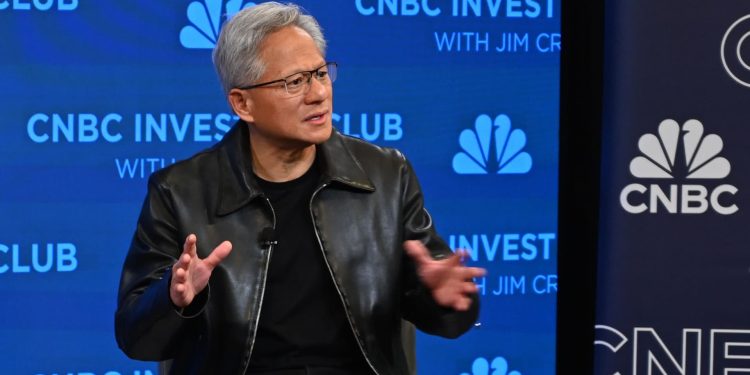Nvidia CEO Jensen Huang on Tuesday dismissed a news report that Oracle was seeing low margins in its business of leasing Nvidia chips to customers. Oracle “is going to do incredibly well,” Huang said in an interview with Jim Cramer at the monthly meeting of the CNBC Investing Club, held Tuesday afternoon at the New York Stock Exchange. Shares of software giant Oracle fell as much as 5% on Tuesday after technology publication The Information reported on the state of Oracle’s Nvidia-centered cloud business amid the high cost of Nvidia chips and aggressive pricing on AI leasing. The stock ultimately closed its lows, down 2.5% at $284.24 per share. According to the report, which cites internal documents, Oracle’s Nvidia cloud business generated $900 million in sales in the three months ending in August with gross margins of 14%. This was well below the company’s overall gross margin of around 70%. Against this backdrop, Huang offered a more nuanced perspective, suggesting that short-term margin pressure would not be out of the question with the new chips. Nvidia’s market-leading AI chips are known as graphics processing units, or GPUs. “When you first develop a new technology, chances are you won’t make any money at first, but over the life of the system, they will be wonderfully profitable,” Huang said. The Nvidia CEO also highlighted the operational complexity of operating large-scale data centers for AI computing. “What Oracle is doing with Nvidia’s systems is not easy,” Huang continued. “These things are giant supercomputers. You have to build infrastructure, you have land, there’s electricity, there’s cooling, and then you have to run these things.” For its part, Oracle stressed that demand was booming. In September, the company said its remaining performance obligations — also known as cloud contract backlog — jumped 359% year over year during its first quarter of fiscal 2026. That was supported primarily by a $300 billion compute deal with ChatGPT creator OpenAI, according to media reports. Oracle also projects $144 billion in cloud infrastructure revenue by 2030, up from just over $10 billion in 2025. The stock soared 36% in a single day on these new cloud contracts and long-term financial projections, even as quarterly earnings and revenue missed estimates. The stock has since fallen about 13%, giving back some of that rise, amid questions about the sustainability of AI investments. Huang also spoke with Cramer about three other key partnerships with Nvidia and the importance of America winning the AI arms race.









